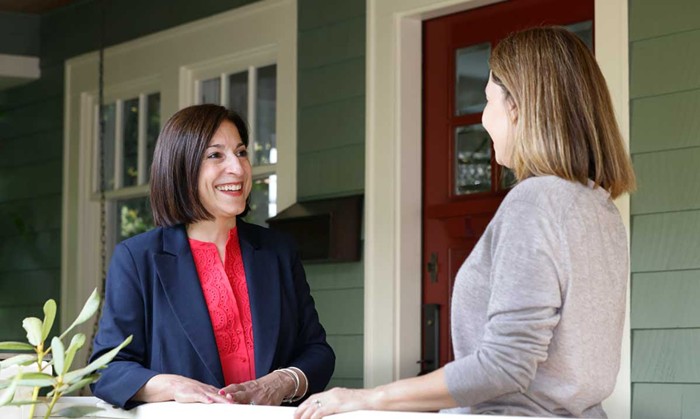Seattle City Council President Sara Nelson, ever out of sync with local Democrats, expressed “real strong concern” for a pair of bills in the Legislature that would give jurisdictions the option to switch their local elections from odd to even years, a reform that passed with overwhelming support in a 2022 King County ballot initiative.
While she acknowledged that even-year elections attract much higher voter turnout, Nelson echoed a quality vs. quantity argument once pushed by Republican County Council Member Regan Dunn and right-wing pundit Jason Rantz: “...Greater turnout doesn’t necessarily mean a better-informed public when it comes to the issues that impact people’s daily lives most directly, which is the stuff that comes out of City Hall,” she said.
These comments in the council’s January 22 briefing mark the latest episode in Nelson’s naked conservatism. During her brief tenure as president, she’s already fired a staffer who she perceived as progressive, installed a conservative who lost her election, and now she’s supporting a status quo of voter suppression with the same infantilizing arguments used to disenfranchise Black would-be voters during the Jim Crow era.
Bill Background Info, If You Even Care
Rep. Mia Gregerson (D-SeaTac) introduced House Bill 1932 this session to give localities the option to move their municipal elections to even years, a move that she believes, and that research shows, increases voter turnout.
Gregerson has tried and failed to pass the policy several times, but Washington Community Alliance Executive Director Kamau Chege, who advocates for consolidating elections, said that support appears to be growing. He feels confident as the bill advances to its second reading, moving quicker than other legislation this year, that it could land on the Governor’s desk.
Legislators from King County seem especially supportive this year after seeing voters pass a ballot measure to move County elections to even years, Chege said. Seattle Reps. Darya Farivar, Emily Alvarado, Liz Berry, Julia Reed, Nicole Macri, Chipalo Street, plus King County-area Reps. Tina Orwall, Roger Goodman, and Kristine Reeves all cosponsor HB 1932. On the Senate side, Seattle Sens. Javier Valdez, Noel Frame, Bob Hasegawa, Joe Nguyễn, Jamie Pedersen, and King County-area Sens. Patty Kuderer, Manka Dhingra, Karen Keiser, and Derek Stanford all cosponsor its unofficial companion bill, Senate Bill 5723.
Despite huge support from Nelson’s local peers, Alan Durning, the founder of Sightline Institute, said he and other democracy reform advocates are not surprised with Nelson’s comments. After all, she benefited from disenfranchisement.
“When you’re Sara Nelson and you got elected when half the electorate was looking the other way, you might be concerned under a system where more people know you’re on the ballot,” said Chege.
Incumbents Gonna Incumbent
Nelson won her election in 2021, when 55% of registered voters in Seattle turned in a ballot and 53% voted in her race against social justice powerhouse Nikkita Oliver. For comparison, the next year in the midterm elections, some Seattle legislative races saw nearly 75% turnout. In the year before Nelson’s win, which featured the very sexy 2020 presidential race at the top of the ticket, those same legislative districts saw 90% turnout, and more than 85% of registered voters weighed in on the Seattle congressional races.
Digging a little deeper, precinct-level data shows that voters in wealthier, whiter areas along the waterfront tend to come out for every election, including odd-numbered years. These are the voters who put Nelson and the new crop of corporate stooges on the council.
On the other hand, the voters who pick progressives such as Oliver, who live in more racially diverse, working-class, interior areas, vote at lower rates in every election, but they especially drop off in odd years. These lower turnout voters tend to rent, so they may move more often and forget to update their ever-changing address on their voter registration to catch every one of the four elections the County holds each year. Plus, political consultants sometimes advise against putting too much money or energy toward winning these voters because they don’t show up as often. Vicious cycle.
So, if you’re a corporate husk who campaigns on the fears of wannabe suburbanites along the waterfront, you may have to shake up your strategy in an even-year election.
What’s Next, Literacy Tests?
But Nelson didn’t say anything about specifically wanting to exclude progressives, or poor people, or people of color—she’s just worried a higher turnout would mean a less-informed voting public. Democracy advocates have heard that one before.
“This country has a sad history of questioning voters' knowledge,” said Durning, noting that during the Jim Crow era states forced Black would-be voters to pass racist, classist “literacy” tests to prove they were worthy of participating in democracy.
It's hard to measure how much information a given voter possesses, and, as Washington Bus Political Manager Jazmine Smith said in an interview, it's not up to Nelson or anyone else to be the arbiter of which voters are informed enough. Nevertheless, Durning said research shows that electeds selected during higher-turnout elections align better with the electorate in terms of demographics and beliefs.
“It’s not a direct measure of information, but voters must have enough information to choose someone who speaks for their values,” Durning said.
Besides, voters typically don’t conduct hours and hours of independent research on each race. Instead, Durning said, they consult the State or County voter guide, their more politically savvy friends, or the news outlets they trust.
So, Durning argued, it wouldn’t make much of a difference if there were 10 races or 30 races on a given ballot. Regardless of what Nelson thinks of low-propensity voters’ information levels, down-ballot races see more turnout in even years than top-of-ballot races do in odd years, according to Sightline.
While Nelson did literally say “greater turnout doesn’t necessarily mean a better-informed public,” she didn’t put all the blame on individual voters. She worried that national races may overshadow local races in the media, and that local organizations may not have capacity to conduct candidate forums and other forms of voter education with other big races taking priority.
Sure, I look at the list of elections The Stranger and every other media outlet needs to cover this year and feel my palms start to sweat, but, frankly, if you worry that local races will get drowned out in the media, the answer is not to accept half as much voter turnout, the answer is to invest in local media. If Nelson’s so worried, I encourage her to donate to The Stranger.
As for organizers, Smith seems to think the Washington Bus can handle the workload of consolidated elections. It would make the job of reminding voters to vote in the first place a lot easier!
More on Nelson
Nelson has opposed election reforms in the past. In July 2022, the Seattle City Council voted to put their own ballot measure for Ranked Choice Voting (RCV) alongside a citizen-run initiative for Approval Voting, which some argued would work against minority or anti-establishment candidates.
Nelson, joined by then-Council President Debora Juarez, voted against adding RCV to the 2022 ballot. She argued that the council should “just get out of the way,” despite working perfectly within their bounds by adding an alternative measure. At the time, former Council Member Teresa Mosqueda countered Nelson, saying, “There's nothing more democratic than giving voters a choice on something so consequential.” Voters ultimately chose RCV. See ya in 2027, baby.
Nelson’s emerging pattern of squeamishness about democracy reforms emboldens claims that the new council prez is out of step with Seattle voters.
“When an elected official stands against democracy reform after democracy reform, then it really makes me wonder about how they feel about their constituency and if they feel only a certain subset are willing to continuously elect them,” said Smith.




















